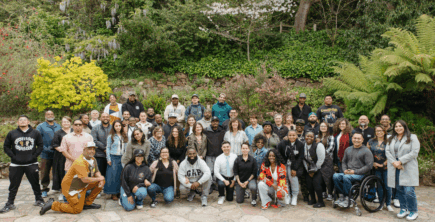
LGBT

At Tides, we work with a wide range of visionary corporate leaders who are committed to values-aligned impact. At our 2020 Corporate Impact Leaders Forum (CILF) virtual events, many of these Tides partners shared what they’re thinking about and doing when it comes to corporate social impact (CSI). What we found most inspiring—even during a time of great collective anxiety—was the desire among our partners to continue to build and nurture a powerful community of CSI leaders into 2021 and beyond.
PURPOSE + PROFIT
Among the headlines from the forum conversations was that CSI’s moment has truly arrived. Given that so many urgent issues require attention and action, it was inspiring to hear company leaders doubling down on their commitment to “purpose + profit.” More and more businesses are embracing the core tenet of stakeholder capitalism: that companies have vital responsibilities to employees, customers, and communities, as well as shareholders.

At Tides, we are emboldening corporations to see themselves as change agents tackling the most pressing social issues of our time, including climate change, racial equity, individual and community health, quality education for all, and much more. (Photo © Leon)
Now, we want to push that sentiment further. At Tides, we are emboldening corporations to see themselves as change agents tackling the most pressing social issues of our time, including climate change, racial equity, individual and community health, quality education for all, and much more. In her remarks during the culminating CILF conversation, Tides CEO Janiece Evans-Page noted how the events of 2020 sparked so many businesses to rethink core practices and strategies tied to issues impacting vulnerable communities around the nation.
As the former vice president of global philanthropy and sustainability at Fossil Foundation, Evans-Page said she has a firsthand understanding of the challenges facing businesses and corporate leaders who are committed to advancing social change. “This is hard and sometimes messy work, and I thank you for showing up in ways that are meaningful to communities,” Evans-Page told participants.
One Tides partner showing up in this moment in an outstanding way is PagerDuty.org Fund. Giving back and creating positive change through their people, platform, and profit have always been embedded in the company’s DNA. As COVID-19 exacerbated the disparities in access to quality care, and as the racial reckoning of 2020 inspired the business community to take action, PagerDuty focused on advancing “time-critical healthcare” for those most marginalized and launched a grant round with a sharp focus on getting coronavirus vaccines to underserved populations and hard-to-reach communities. “We’re committed to protecting and advancing equal opportunity for all persons to enjoy maximal health and well-being by helping ensure everyone has the opportunity to be vaccinated including and especially those who have historically been economically or socially marginalized”, said Olivia Khalili, PagerDuty’s Vice President for Global Social Impact and Philanthropy.
CENTERING RACIAL JUSTICE AND SHIFTING POWER

Zoom’s Head of Social Impact Roxana Shirkhoda asks “What would it look like to invite movement leaders to the decision-making table? Let’s ask them how they think we should spend the money.” (Photo © heylagostechie)
CILF speakers unanimously affirmed a real shift towards embracing racial justice as core to progress. Corporate leaders now recognize that their companies can’t be truly successful when so many Black, Indigenous, and people of color (BIPOC) communities are struggling with the consequences of systemic racism. In response, businesses are increasing their giving to BIPOC-led nonprofits, they are re-examining procurement and supply chain policies using a racial justice lens, and they are overhauling hiring and promotion practices with a focus on diversity and inclusion.
Different companies are tackling racial injustice in different ways. At Google, it’s about transforming systems that oppress communities of color, including the criminal justice system. “We’ve been pushing Google’s philanthropy to achieve justice and shift power,” Justin Steele, director of Google.org Americas, told participants in one of the Tides events. “That can make this moment challenging, but I think it’s something we need to start exploring within our companies.”
Shifting power is also a priority for Zoom, where Head of Social Impact (and former Tidester) Roxana Shirkhoda is exploring how to engage communities of color and other marginalized populations in decisions about the company’s philanthropy. “In traditional corporate social impact, it’s more than likely the case that grantmaking decisions are made by those running the strategy, perhaps with input from company employees,” Shirkhoda said. “What would it look like to invite movement leaders to the decision-making table? Let’s ask them how they think we should spend the money.”
CSI COMMUNITY BUILDING
CSI is a type of “full-body” activity that involves the head, the heart, and the gut, highlighting the equal significance of three essentials in this work: intellectual rigor, humanity, and values.
In the words of Erin Baudo Felter, vice president of social impact at Okta, CSI is a type of “full-body” activity that involves the head, the heart, and the gut, highlighting the equal significance of three essentials in this work: intellectual rigor, humanity, and values. Even as CSI takes a more prominent role at companies big and small, this work can be lonely by nature. That’s why Tides is building a community of CSI leaders and practitioners, a space for all of us to engage with one another and, perhaps more importantly, with grantees, community leaders, and those whose lives are most affected by the issues we tackle. That’s how we achieve values-aligned impact with our partners, and it’s also how we answer the question Janiece Evans-Page raised in her forum remarks: “How do we do more, faster?”
We want to hear your thoughts on how Tides can best support this community to learn and grow, especially as we plan more of these community events for 2021. Please fill out our survey and let us know what you’d like to see. We look forward to working with you and your company to help fuel real and lasting change.

LGBT

Corporate Partners

Philanthropy

Read the stories and hear the voices of social change leaders fighting for justice.